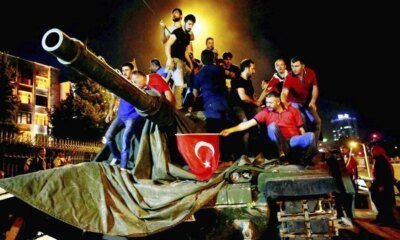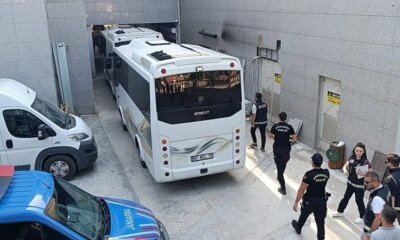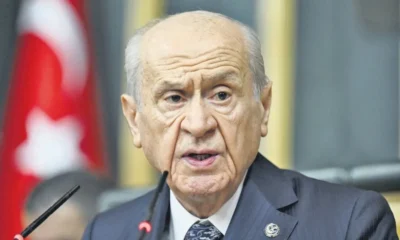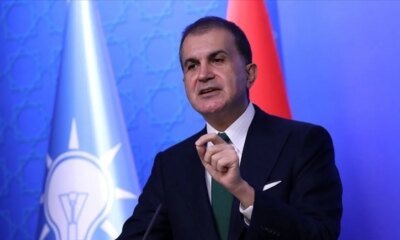Politics
Türkiye’s ruling AK Party to chart the future in strategic workshop
The ruling Justice and Development Party (AK Party), in power since 2002, is looking to reinvigorate its political vision through a sweeping consultation process that brings together Cabinet members, party officials and grassroots voices in a workshop this weekend, according to the party’s secretary-general, Eyyüp Kadir Inan, on Tuesday.
The event, themed “Leadership that Exceeds Borders with the Power of the Nation,” aims to cement the party’s strategic road map leading into 2025 and 2025 with a renewed emphasis on structural reform, social cohesion and global diplomacy, Inan told Anadolu Agency (AA).
“To best examine the issues of Türkiye, our youth, women, tradespeople and every constituency, the AK Party will address these under various titles, from security to society, economy to development,” Inan said.
The party is gearing up to assemble all cadres at the workshop in Ankara from July 11-13, which will contribute to achieving results that will strengthen both our party policies and government practices,” Inan noted.
“We are living in a period when the world seeks the consultation of Türkiye, our state and President Recep Tayyip Erdoğan as the focal point for solutions to all the gangrenous problems it is in,” Inan said.
As its 24th anniversary on Aug. 14 nears, Inan said the AK Party is hoping the workshop will further galvanize its policy-making processes, reinforce its reform agenda, and fortify the bridge between leadership and the people.
Though the political landscape in the year it was founded propelled the AK Party to the spotlight, landmark steps by successive AK Party governments helped it stay in power for more than two decades. Those include breaking the taboo on several issues, such as the Kurdish question and a headscarf ban.
Along the way, it faced lawsuits for its closure and several coup attempts.
Erdoğan himself was barred from politics after he was imprisoned for 10 months for reciting a poem deemed offensive to the country’s ruling elite, which toppled a coalition government of Erdoğan’s political mentor, Necmettin Erbaka,n in 1997. This ban only ended in 2003, and he became the second prime minister of the AK Party after a brief tenure by Abdullah Gül.
Since then, he has served either as prime minister or president and is credited with expanding his party’s support to the wider public through a string of reforms in public services.
The party was first challenged to remain in power in the 2004 local elections. However, the sweeping social change that brought the AK Party to power as the voice of the previously unheard masses also brought its first municipal election victory. With a vote rate of 41.7%, the AK Party won seats in 1,765 municipalities.
In the next general election, it further cemented its success by winning more than 46% of the vote. The successive elections were almost a carbon copy of each other for the AK Party in terms of the high rate of votes, despite fluctuations at times.
It was not an easy road to power for the party, though, amid strict opposition from remnants of military and judiciary tutelage. In 2008, the party faced closure, while Erdoğan and other senior figures faced political bans when the Constitutional Court approved pleas for the closure of the party. It ultimately staved off the closure at the end of the legal process.
Undaunted, the party did not step back from its goal of the prevalence of democracy. In 2014, Erdoğan had the honor of being the first publicly elected president of Türkiye after legal amendments advocated by the party were approved.
In 2016, Erdoğan handed the seat of the AK Party leadership to Binali Yıldırım, who went on to be elected as prime minister.
In 2017, the party brought another major change to Türkiye. A referendum in favor of an executive presidential system was overwhelmingly approved by the public, also eliminating the clause that the president should resign from his party. In 2018, Erdoğan was elected as the first president of the new system.
Accustomed to the victories, Erdoğan faced a tough test in the 2023 elections. For the first time and in the face of an unprecedented alliance of the opposition, Erdoğan was forced to participate in a runoff election on May 28. Still, the public support apparently did not fade for the president, who won the runoff with more than 52% of the vote.
Politics
PKK disarmament pushes terror-free Türkiye past critical threshold: Çelik
After dozens of PKK terrorists destroyed their weapons in northern Iraq, the terror-free Türkiye goal has passed a critical threshold, ruling Justice and Development Party (AK Party) spokesperson Ömer Çelik said Friday.
In a statement on X, Çelik stressed that the disbandment and disarmament process must be completed “as soon as possible.”
Çelik emphasized that this marks the first concrete step toward dismantling the PKK in line with Turkey’s strategic objective.
“With Mr. Devlet Bahçeli’s historic call and the state’s will manifested by President Recep Tayyip Erdoğan, the determination to turn a historic page in Türkiye’s liberation from the burden of terrorism is progressing stronger,” he stated.
Highlighting cross-party cooperation, Çelik said the frequent consultations between political parties, particularly with the PKK-affiliated Peoples’ Equality and Democracy Party (DEM Party), reflect the growing sensitivity and consensus needed to support the disarmament process.
“Parliament’s will and the contributions of all political parties will have a tangible impact,” he added.
Çelik also assured that state institutions are engaged in coordinated efforts across diplomacy, intelligence and security to ensure the success of the initiative.
He praised the sacrifices of Türkiye’s martyrs and veterans, saying their efforts have preserved national unity and sovereignty under the principle of “one homeland, one nation, one state, one flag.”
“A critical threshold has been crossed,” he said, while warning against provocations that could undermine the process. He stressed that Türkiye remains vigilant against attempts to exploit terrorism for proxy wars or imperialist designs in the region.
“The goal of a ‘terror-free Türkiye’ is not only essential for our nation, but it also inspires the establishment of a broader ‘terror-free zone’ in our immediate region,” Çelik concluded
Politics
Türkiye, ASEAN need stronger ties against global challenges: FM Fidan
Foreign Minister Hakan Fidan on Friday urged stronger collaboration with the Association of Southeast Asian Nations (ASEAN), highlighting common challenges and mutual strategic interests between Türkiye and the Asia-Pacific region.
“Türkiye stands ready to support ASEAN’s 2045 vision for a resilient, inclusive and sustainable community,” he said.
The Turkish foreign minister also reaffirmed his country’s commitment to strengthening ties under all three pillars of the ASEAN community and called for support to elevate Türkiye’s status to a full dialogue partner.
Speaking at the 7th Türkiye-ASEAN Trilateral Meeting on Sectoral Dialogue Partnership in Kuala Lumpur, Fidan said the gathering offered a “timely opportunity” to assess the current state of relations and reflect on common goals.
“The Asia-Pacific region stands at a critical crossroads,” he said, pointing to ongoing geopolitical tensions, economic volatility and environmental disruptions. “Security perceptions have changed as a result of great power competition.”
Fidan noted that countries in the region are adjusting national security strategies, increasing defense spending and placing greater emphasis on economic security. He argued that Türkiye faces similar dynamics in its neighborhood and that current global governance mechanisms are failing to address overlapping crises, with Gaza being a prime example.
“These crises speak to a deeper truth: Our governance mechanisms are fragmented, reactive and often hostage to geopolitical deadlock,” he said. “This is the moment to act collectively and build bridges based on regional ownership.”
Fidan underscored the importance of cooperation with ASEAN, describing both Türkiye and ASEAN as strategically located and economically significant actors in their respective regions.
“ASEAN ranks among the world’s top five largest economies and is a model of regional integration,” he said. “Türkiye is the 17th largest economy globally and one of the fastest-growing among OECD countries.”
Bilateral trade between Türkiye and ASEAN surpassed $15.7 billion last year, according to Fidan, highlighting what he called the “scale of existing potential.”
Türkiye established institutional relations and signed the Treaty of Amity and Cooperation, one of ASEAN’s founding documents, in 2010, before becoming a sectoral dialogue partner in 2017.
Fidan also held bilateral meetings with his counterparts from Malaysia, Brunei, Singapore, Papua New Guinea and Laos on the sidelines of the meeting.
The Turkish Foreign Ministry shared an update on the social media platform X, detailing Fidan’s diplomatic engagements during his visit to the Malaysian capital.
Fidan separately met Malaysian Foreign Minister Mohamad bin Hasan, Brunei’s Second Foreign Minister Dato Erywan Yusof, Laos’ Foreign Minister Thongsavanh Phomvihane, Singaporean Foreign Minister Vivian Balakrishnan and Papua New Guinea’s Foreign Minister Justin Tkatchenko.
Fidan also held a meeting with Australian Foreign Minister Penny Wong.
Politics
Syrian govt looks for momentum for integration of US-backed YPG
Syria’s new administration is looking for a centralized future, while the U.S.-backed terrorist group YPG, the Syrian wing of the PKK, still insists on autonomy in the northeast. Damascus reiterated its rejection of federalism on Wednesday following a meeting with YPG leader Ferhat Abdi Şahin, code-named Mazloum Kobani, calling on the YPG to join the ranks of government forces.
Şahin and interim President Ahmed al-Sharaa first struck an accord for integration in March with U.S. backing, but its implementation has been held up by differences between the two sides. Şahin met with Syria’s leader in Damascus on Wednesday in the presence of a U.S. envoy to discuss stalled efforts to integrate the YPG into the Syrian state.
The YPG, which controls vast swathes of territory in Syria’s north, including oil and gas fields, has demanded a decentralized system of governance, which the new authorities in Damascus have rejected.
A Syrian government source told the official Al-Ekhbaria television channel on Wednesday that Damascus remained committed to “the principle of ‘One Syria, One Army, One Government,’ and categorically rejects any form of division or federalization.”
“The Syrian army is the national institution that unites all children of the homeland, and the state welcomes the integration of Syrian fighters from the SDF into its ranks within the approved constitutional and legal frameworks,” the source said, referring to the umbrella body Syrian Democratic Forces (SDF) dominated by YPG terrorists. The source also warned that any delays in implementing integration risked hindering efforts to “restore security and stability to all regions.”
In an interview with the TV channel Kurdistan 24, U.S. Ambassador to Türkiye and special envoy to Syria Tom Barrack said that while he recognized the SDF’s role in the fight against Daesh, it had to accept the “reality” that “the only future path for them is Damascus.”
Al-Sharaa had previously called for the dissolution of all armed groups in Syria.
Meanwhile, in an interview in May, Şahin emphasized the need for a “decentralized Syria where all its components live with their full rights,” an outcome he accused Syria’s new authorities of opposing.
The same month, Syrian Foreign Minister Asaad al-Shaibani warned that delaying the integration of the self-styled autonomous administration could “open the door to foreign interference, and fuel separatist tendencies.”
Barrack, told The Associated Press (AP) after the meetings in Damascus that there are still significant differences between the sides.
Barrack’s meetings came after a move by the Trump administration took effect this week, revoking a terrorism designation of the former insurgent group led by al-Sharaa, which was behind a lightning offensive last December that ousted Syria’s longtime autocrat Bashar Assad. Revoking the designation was part of a broader U.S. engagement with al-Sharaa’s new, transitional government.
Under the March deal, the SDF forces would merge with the new Syrian national army. The agreement, which is supposed to be implemented by the end of the year, would also bring all border crossings with Iraq and Türkiye, airports and oil fields in the northeast under the central government’s control. Detention centers housing thousands of Daesh members, now guarded by the YPG, would also come under government control.
However, the agreement left the details vague, and progress on implementation has been slow. A major sticking point has been whether the YPG would remain as a cohesive unit in the new army or whether the force would be dissolved and its members individually absorbed into the new military.
Barrack said that it is still “a big issue” between the two sides. “I don’t think there’s a breakthrough,” Barrack said after Wednesday’s meetings. “I think these things happen in baby steps, because it’s built on trust, commitment and understanding.”
He added that, “For the two parties that have been apart for a while and maybe had an adversarial relationship for a while, they have to build that trust step by step.”
Barrack said that though “we’re not there” yet, Damascus had “done a great job” in presenting options for the YPG to consider. “I hope they will and I hope they’ll do it quickly,” he said.
A key turning point for Syria came when U.S. President Donald Trump met with al-Sharaa in Saudi Arabia in May and announced that Washington would lift decades of sanctions, imposed over Assad’s government. The U.S. played a key role in brokering the deal announced in March between al-Sharaa’s government and the YPG and urged it to integrate with Damascus.
Barrack said Washington has “complete confidence in the Syrian government and the new Syrian government’s military,” while the YPG has been a “valuable partner” in the fight against Daesh and that the U.S. “wants to make sure that they have an opportunity … to integrate into the new government in a respectful way.” The U.S. has begun scaling down the number of troops it has stationed in Syria. There are about 1,300 U.S. forces now, but Barrack said Washington is in “no hurry” to pull out completely.
In the interview with the AP, Barrack also downplayed reports of possible breakthroughs in talks on normalizing ties between Syria and Israel.
“My feeling of what’s happening in the neighborhood is that it should happen, and it’ll happen like unwrapping an onion, slowly … as the region builds trust with each other,” he said without elaborating.
Since Assad’s fall, Israel has seized a U.N.-patrolled buffer zone in Syria bordering the Israeli-annexed Golan Heights and has launched hundreds of airstrikes on military sites in Syria. Israeli soldiers have also raided Syrian towns outside the border zone and detained people whom they said were militants, sometimes clashing with locals.
Politics
CHP mayor for Istanbul district detained for corruption
Özgür Kabadayı, the mayor of Istanbul’s Şile district, was among six suspects detained by financial crimes police on Thursday on charges of running a criminal organization, bribery and tender rigging.
He is the latest mayor from the main opposition Republican People’s Party (CHP) to be detained in corruption investigations since last year. Details of the investigation into Kabadayı and other suspects are not clear yet.
Media reports said the investigation included testimonies of eyewitnesses, particularly on bribes to municipal officials. A businessperson told investigators that municipal officials asked for bribes for doing business with the municipality in the district, which is a popular weekend getaway for Istanbulites. The unnamed businessperson said that as a supporter of the CHP, he was disturbed by municipal officials’ actions, adding that he witnessed a colleague paying TL 300,000 ($7,490) to a municipal official for a construction permit. Another businessperson testifying said he paid TL 8 million to municipal officials.
A barrage of investigations focusing on CHP-run municipalities across Türkiye netted mayors and municipal bureaucrats accused of taking bribes in exchange for building permits, rigging tenders and other forms of corruption involving municipal businesses. President Recep Tayyip Erdoğan branded the investigations as efforts to unveil the “tentacles of an octopus of corruption.” The CHP claims the charges are politically motivated, while authorities highlight that the judiciary is independent of any political influence and point out that some investigations were launched upon complaints by CHP members themselves against mayors and municipal officials.
Although several mayors before him were detained or arrested in corruption probes, the arrest of Istanbul Mayor Ekrem Imamoğlu in March for alleged corruption triggered protests by the CHP. CHP Chair Özgür Özel led the protests that occasionally descended into all-out riots. Recently, Özel openly threatened an uprising against the democratically elected government if the corruption investigations continue, prompting outcry from CHP critics who accused him of attempting to instigate a coup.
Imamoğlu, who is declared a future presidential candidate by the CHP after his arrest, faces a spate of accusations alongside corruption charges, including forging his university diploma, and insulting and threatening prosecutors who investigated him.
President Erdoğan says the investigations are needed to address a vast network of corruption and has urged patience. On Wednesday, he said he approved a call by government ally Devlet Bahçeli to amend regulations for the live broadcast of trials of mayors.
Rıza Akpolat, the mayor of the Beşiktaş district of Istanbul for the CHP, was the first mayor to be detained and subsequently arrested in a crackdown on an alleged network of corruption. A businessperson awarded contracts by his municipality and other CHP-run municipalities has testified about the widespread corruption, especially in public tenders, which led to the expansion of the probes. Since then, hundreds of people have been detained on related charges, from businesspeople who confessed to bribes and mayors who took them.
According to the review of legal filings and state disclosures, 14 CHP mayors and more than 200 party members or local officials have been jailed pending trial.
Of those, more than 220 were imprisoned or put under house arrest, according to the review, which was based in part on a compilation of reports by Anadolu Agency (AA).
Since Tuesday last week, the investigation has spread to Izmir, Türkiye’s third-largest city, as well as Antalya, Adana and Adıyaman, leading to the detentions of former and incumbent mayors of those provinces.
Confessions of deputy mayor
Also on Thursday, media outlets published confessions of Mehmet Engin Tüter, the deputy mayor of Antalya’s Manavgat district, who was caught red-handed while accepting bribes in a police sting last Friday. Tüter was caught on video as he was ordered by police officers to open a box of baklava handed to him minutes before by a businessperson. The footage showed that the box contained a stash of euros. Other footage showed him discreetly accepting the box, fully aware of the cash hidden inside.
After his detention, Tüter invoked the “effective repentance” law that grants lenient sentences for suspects in exchange for confessions and detailed how other municipal officials were involved in bribes. Tüter is the deputy working under Mayor Niyazi Nefi Kara, who was earlier detained on corruption charges.
He told investigators that Kara set up a team of associates comprised of his friends and next of kin after he took office, after winning the 2024 municipal elections. He said Kara’s nephew and a friend were assigned as key bureaucrats in the municipality. “(Kara’s nephew) Hüseyin Cem Gül was very active at the municipality. Although he had no official post at the municipality, the mayor had instructed bureaucrats to consult with him, particularly while issuing building licenses and permits, especially for hotels,” the deputy mayor of a popular tourist destination told investigators.
“No one was able to secure a license without asking Gül first,” he said.
Tüter said the municipality allowed a hotel to run several shops without proper licenses, apparently in exchange for bribes, and issued licenses for two other hotels though they did not comply with building regulations, claiming that Gül “benefited” from permits.
He said the mayor asked an assembly member to recruit a wrestler for the municipality’s sports club, in exchange for allowing the said member to build more rooms for her hotels, though it was against regulations. Tüter stated that the said wrestler was also paid TL 4 million by the assembly member who was in charge of the sports club.
Tüter said that in one case, a hotel owner was asked to “furnish” the office of the mayor in exchange for a permit.
Politics
Türkiye’s new climate law prioritizes welfare, agriculture: Directorate
Türkiye’s newly enacted climate law places a strong emphasis on protecting social welfare while prioritizing key sectors like agriculture and animal husbandry, according to Halil Hasar, director of the Climate Change Directorate at the Environment, Urbanization and Climate Change Ministry.
Speaking to Anadolu Agency (AA), Hasar described the law as a strategic, domestically tailored step that balances environmental responsibility with economic priorities.
“The climate law was planned entirely considering Türkiye’s historical responsibilities and current situation,” he said. “It does not restrict the freedom of any individual, does not worsen social welfare, and prioritizes agriculture, animal husbandry, water resources and climate justice.”
The law, passed by the Turkish Parliament on July 2, will be coordinated by the Climate Change Directorate, but its implementation will involve all relevant public institutions and organizations.
Hasar echoed President Recep Tayyip Erdoğan’s recent remarks, calling it “a completely domestic and national law.”
He said that criticism of the law largely stems from its name rather than its actual content.
“There are no articles penalizing or restricting individuals. The regulations are preventive and guiding, especially for industry,” Hasar said.
Addressing concerns from the industrial sector, Hasar emphasized that the law introduces protective obligations rather than punitive measures. He pointed out the importance of aligning with global economic trends, particularly the rise of border carbon regulation mechanisms.
“If you don’t take precautions, one day you may not be able to export a good you produce here,” he warned.
Türkiye, as a nation committed to international trade and economic growth, must prepare for the evolving global climate policies, Hasar concluded.
The new law aims to ensure the country stays competitive while advancing environmental sustainability and social equity.
Politics
Erdoğan says Türkiye rejects efforts to deny Srebrenica genocide
President Recep Tayyip Erdoğan on Friday said Türkiye rejects all statements that seek to deny the Srebrenica genocide or “glorify war criminals” in defiance of international court rulings.
Erdoğan’s remarks came in a video message marking the 30th anniversary of the 1995 Srebrenica massacre, which claimed the lives of thousands of Bosnians.
Erdoğan also reiterated Ankara’s continued and unconditional support for Bosnia-Herzegovina’s territorial integrity, sovereignty and constitutional order.
Touching on Israel’s relentless ongoing attacks on Gaza, Erdoğan said that decades ago, the international community remained silent on Srebrenica, and now, in recent years, it is a mere bystander to the oppression taking place in Palestine.
Erdoğan vowed that the Israeli government will be held accountable “sooner or later” before the law and history for its genocide of nearly 58,000 Palestinians.
Hakan Fidan, Türkiye’s foreign minister, also marked the 30th anniversary of the Srebrenica genocide with a message shared on social media.
“This profound tragedy, whose pain remains deeply felt in our hearts, has left an indelible mark on humanity’s conscience,” he said. “Remembering it and ensuring it is never forgotten is a collective responsibility we all share.”
Genocide Memorial Museum
Also on Friday, Parliament Speaker Numan Kurtulmuş officially opened the Srebrenica Genocide Victims Memorial Museum in Bosnia-Herzegovina in a poignant ceremony.
The museum, established through a joint initiative between the Turkish Cooperation and Coordination Agency (TIKA) and the Srebrenica Memorial Center, stands as a stark reminder of the 1995 genocide that claimed the lives of over 8,000 Bosniak men and boys.
The museum is located in a former battery factory in Srebrenica – the very location where victims were held before being executed. Speaker Kurtulmuş was welcomed at the site by Bosnian Presidential Council members Denis Bećirović and Željko Komšić.
During his visit, Kurtulmuş toured the museum’s exhibits, which include remains of genocide victims, personal belongings, harrowing photographs and video footage from the 1992-1995 Bosnian War. He received a detailed briefing from museum officials and signed the memorial book dedicated to the victims.
Kurtulmuş was accompanied by a Turkish delegation and Bosnian officials, emphasizing the significance of Turkish-Bosnian cooperation in preserving the memory of the genocide.
“This museum is not only a memorial to the victims but also a call to humanity to never forget the horrors committed here,” said Kurtulmuş during the opening ceremony.
Remembering Srebrenica
On July 11, 1995, Serb forces under the command of Ratko Mladić seized the town of Srebrenica. Thousands of Bosnian civilians, seeking protection from Dutch U.N. peacekeepers, were ultimately handed over to Serb forces.
While women and children were sent to territory held by Bosnian government forces, an estimated 8,372 Bosniak men and boys were systematically murdered in forests, factories and warehouses. Their bodies were buried in mass graves, many of which remained undiscovered for years.
Today, identification efforts continue, with remains being recovered and reburied annually at the Potocari Memorial Cemetery every July 11, the anniversary of the massacre.
The new museum aims to educate future generations, honor the memory of the victims and reinforce the global call to prevent genocide in any form.
-

 Daily Agenda3 days ago
Daily Agenda3 days agoIf we forget, our blood is dry – last minute news
-

 Economy3 days ago
Economy3 days agoTurkish business union leads push for Syria’s reconstruction
-

 Daily Agenda2 days ago
Daily Agenda2 days agoBAKLAVA arrested bribes in the box
-

 Daily Agenda3 days ago
Daily Agenda3 days agoHard warning from Bahçeli to Özel: No, are you thinking of a coup? Let’s see the streets and see
-

 Refugees2 days ago
Refugees2 days agoTurkey bans Musk’s AI chatbot Grok for offensive content
-

 Sports2 days ago
Sports2 days agoSüper Lig transfer frenzy heats up with Kökçü, Osimhen, Rashford
-

 Politics3 days ago
Politics3 days agoTürkiye probes FETÖ infiltration into Foreign Ministry
-

 Daily Agenda1 day ago
Daily Agenda1 day agoAK Party Spokesman Ömer Çelik: The process of releasing arms will be in 3 main categories




